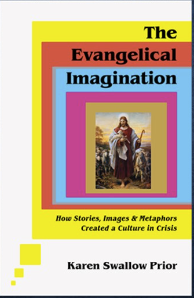Review: The Evangelical Imagination, Karen Swallow Prior, Brazos Press
Karen Swallow Prior calls herself an evangelical, so this book is an attempt, to use her own metaphor, to examine the foundations of the house she is living in, and she finds plenty of cracks. She describes evangelical culture as being in ‘crisis’ and needing a reformation, due to a conflation of Western or American culture with Christianity (evangelical support of Trump being a glaring symptom of a wider problem).
She writes that, while important ways of communicating, ‘stories, images and metaphors’ influence our thinking without our realising it, causing us to prioritise some things and miss others. Whether you think of yourself as evangelical or not, her book is helpful for recognising when aspects of faith that we think are universal are actually products of or distorted by the culture we find ourselves in. In contrast, Christians are often asked to step aside from contemporary culture.
She writes that much of what is American evangelical culture is actually Victorian culture. In turn, Victorian mores were influenced by eighteenth century evangelicalism. One of the ideas central to evangelicals is progress, and we can trace this to the very popular book by John Bunyan.

A linear view of history is strongly Christian, building on Judaism, but right through to pre-Enlightenment times, daily life was seen as cyclical and seasonal. This was reflected in the church year, and in the weekly (and daily) process of repentance and absolution. But the idea of constant improvement in contemporary society is a legacy of evangelicals, and is also central, of course, to capitalist ideas of wealth building and endless economic growth.
Related to the idea of improvement is the nonnegotiable evangelical notion of being spiritually born again. Being born again features in the church’s beginnings, in the gospels and with Paul, but the conversion was particularly strong in the Awakenings in America, a reaction to much of the churches being what Prior calls spiritually asleep (and, we might add, complacently tolerant of society’s hierarchies).
Evangelicals, including Prior, can barely imagine Christianity without the born-again experience, even if she recognises that it can put too much emphasis on a public performance of religious feeling (something the original Methodists were criticised for), and can be manipulated by the likes of televangelists.
This is all very interesting, in how it relates to modern notions of individualism and what personal belief means. A key tenet of evangelicalism is an individual, conscious choice of Christ as personal saviour, but this perhaps underestimates the unavoidable influence of family and society, which in the past were crucial to Christian identification. And in contrast to the evangelical experience, a ‘follower’ of Christ might be someone who has not had an obvious conversion experience but goes about their Christian work quietly anyway.
Prior recognises that conversion entails changes to one’s whole life, so she also recognises that evangelicals have fallen short in prioritising individual belief over ethical practice. At the same time, she is not consistently down on her evangelical brothers and sisters (and neither should we be), happy to point out that evangelical belief was vital for social changes in the nineteenth century that entailed alleviating poverty and combatting slavery.
She is less enthusiastic about another obvious marker of evangelicalism (even if it is not something that is normally listed as a fundamental evangelical belief, such as by the National Association of Evangelicals), the rapture, which occupies best-selling books, including works of fiction. Prior notes the oddity that these novels, such as the ‘Left Behind’ series, have influenced evangelical biblical interpretation, at least informally, not to mention skewed political thinking. More widely, these books are evidence that evangelicalism is a ‘commercial religion’, embedded in materialist culture. Hence the stores filled with what Prior calls Christian ‘junk’.
These stores also feature a profusion of Christian self-help books. Being permeated by self-improvement psychology, there is a danger that this culture privileges the individual and neglects the need for change in society’s structures (something that was not lacking in early manifestations of evangelicalism). This way of thinking ties action to emotion not duty, and also risks simplifying and sentimentalising faith and life.
This simplification and sentimentalisation is evident in Victorian attitudes to women, which have trickled down into contemporary evangelical culture. There have been many books lately that have exposed the toxic and often contradictory expectations on women within evangelical churches. Prior writes that this is an unrealistic response to the messiness of life.
But it is complex – Prior also notes that the Victorians placed an emphasis on the character of women, rather than their social class, something that has also trickled down into contemporary society, certainly for the better.
Victorian attitudes of colonialism have also, Prior suggests, influenced evangelicalism, especially in regards to mission. It is very easy for Christian mission to take on an air of cultural superiority. This extends to the entanglement of business philosophy and American Christianity.
Christianity has been part of a suite of supposed civilising incursions wherein Westerners emphasised that model citizens are those who make as much money as they can – even that this is a Christian duty. It is not coincidental, writes Prior, that evangelical pastors started wearing business suits in church, and that models of leadership and growth are taken from the world of business and applied to churches.
This is all part of the subversion of Christianity into the culture of capitalism in America, under the misguided assumption that American society is an unashamed display of Christian values.
Nick Mattiske blogs on books at coburgreviewofbooks.wordpress.com and is the illustrator of Thoughts That Feel So Big.














